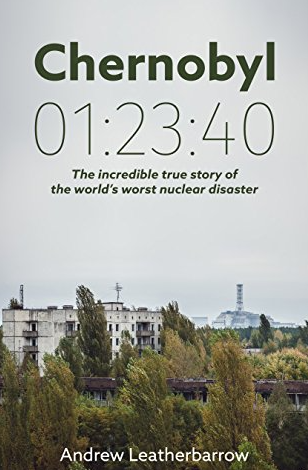Book Review: Chernobyl 01:23:40 by Andrew Leatherbarrow

I’ve been fascinated by what happened at Chernobyl for a long time. Many of my readers wouldn’t know that when I first started university, I was studying nuclear physics and mathematics. Wasn’t long afterwards that I headed into computing but, at the time, there were very few degree courses on what’s now called computing.
I decided to move on from that study for many reasons, but a primary one was that I could see Australia heading into a pretty solid ban on using nuclear power. The only reactor running in the country was a high flux reactor at Lucas Heights and was used primarily for producing medical isotopes. (It was replaced by a 20MW open-pool lightwater reactor in 2007).
The ban on reactors in Australia has pretty much continued to this day, but there is now some renewed interest. Given the abundance of sunshine, wind, waves, etc. here, you wouldn’t think we’d need them now, but over the years, we’ve continued to mostly use coal. And while we’ve come a long way with renewables now, we’re still far, far behind where we need to be to provide our base load needs from alternatives. For a start, we’d pretty much have to rewire the country.
It does fascinate me that if you ask the average person here about nuclear power though, they quote details of a handful of accidents, and primarily from reactors built in the 1970s. There is an assumption that what would be built in 2023 is the same as what was built in 1971. Even allowing for the difference in severity, if we applied that logic to other areas, we would have, for example, stopped using aircraft long ago (drastically more people have died from aircraft accidents and incidents). And there seems to be a wilful blindness to the deaths directly and indirectly linked to the use of coal. Perhaps they just aren’t as spectacular.
Chernobyl
I’ve seen a lot of material about Chernobyl over the years. I think my standout favourite was a 1996 Horizon documentary from the BBC called Inside Chernobyl’s Sarcophagus. I saw it back in 1996 and it was the first time that I really started to understand what had happened there, and more importantly, how poorly the government reacted and how poorly those involved were treated. It had such a wake-up call about how technologies that we thought would work, just didn’t.
I’m not sure why Andrew Leatherbarrow’s book Chernobyl 01:23:40 recently got me interested. It might have been the renewed public interest in the accident from the recent HBO/Sky miniseries. (I already knew enough about the accident to note the amount of dramatic license taken by the miniseries). I listened to Andrew’s book on Audible.
The book was really not what I was expecting. And I say that in a good way.
Rather than just a dry rehashing of facts, it was Andrew’s personal story. He had researched the accident for many years, and finally managed to make a trip to visit the site. For him, it was like a pilgrimage.
The book describes not only what he saw when he got there, but also the details of the trip, from the planning stages, to how he and his companions managed to get around when nearby, on site, and more.
I also particularly liked the detail he had on the legendary Chernobyl divers.
Summary?
Have to say that I thoroughly enjoyed it.
8 out of 10
2023-08-12
